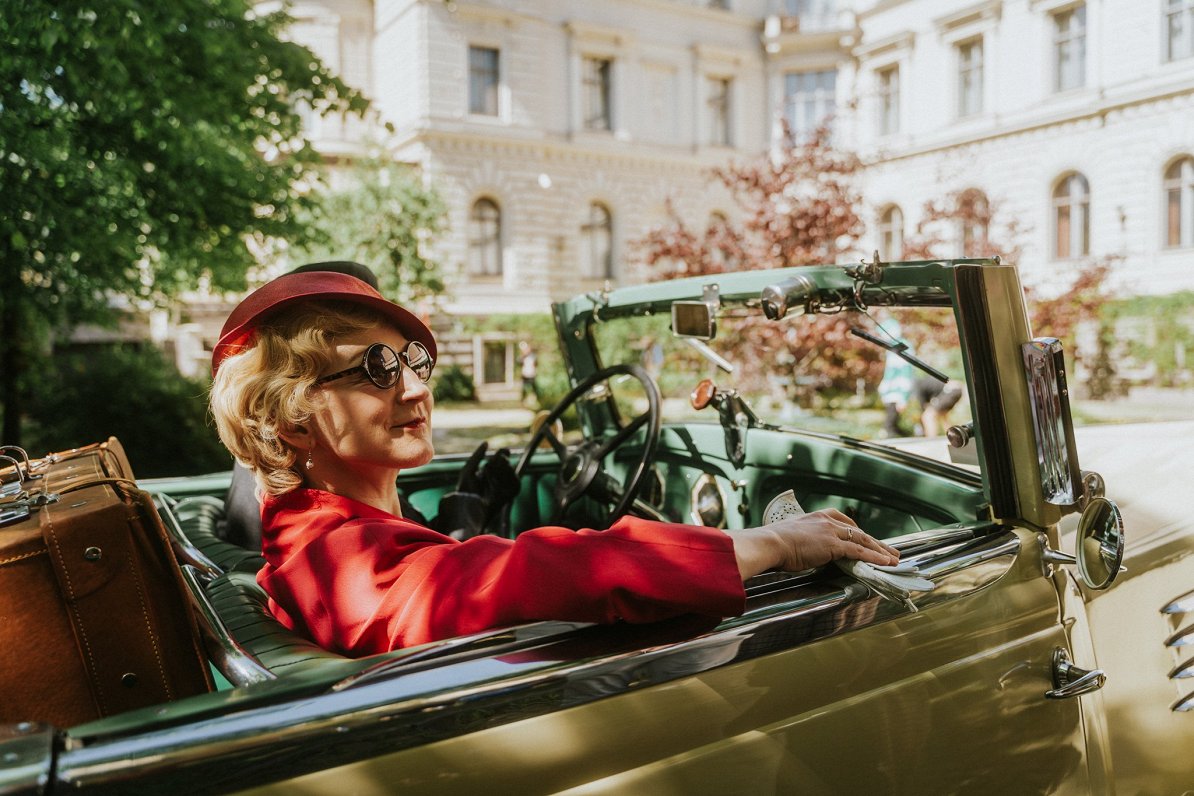Seven series in one evening
Those who have not yet done so will find the film on the streaming platform “Tet +”, now going to the so-called “binge watching” – watch 6 series and a documentary in one evening or wait until 2022, when it will be available on LTV. Equally insignificant – season after season – I once watched the British popular historical drama “Kronis”. The creators of “Emilija” often mention this as a reference to examples of foreign series – the Latvian “aristocracy” has the right to be immortalized on the screen to the same extent. “Kronis” represents the last 70-80 years of British royal history, with scandalous objections from the “real kings” over the inevitable “as was” discussion, with the popularly elected Princess Diana and the ever-present “yellow spirit” marking the boom in paparazzi culture in the 1990s. . The British have always been indefatigable consumers of royal rumors – at least once a week, news reports appear in local tabloids, at garden parties and family gatherings, even in the metro and supermarkets.
Kings and observers
We do not really have such a cultural layer today, but in the 20th-30th centuries. years, in the Benjamin era, for them in the “Evening News” type editions both rubbing their tongues. The living of aristocrats outside the community has always been compelling – a litmus test of society, showing both greedy and jealousy and the tendency to consume scandals and sometimes become an amateur socialist, judging whether Benjamin and the royal family are not too rich. What separates these two families at the core is the legacy of the work that has been done since childhood.
The Benjamin couple, both in the film and in their lives, are the ones who have increased their wealth with smart decisions, hands-on talent, and the ability to feel the prevailing trends in society.
Multi-series film “Emily. Queen of the Latvian Press ”
Photo: Andrejs Strokins
–
–
The story of the film covers the period from the beginning of Emilia Benjamin’s magazine Recreation in 1924 to her death in Siberia in 1941. We get to know Emily as a smart and economical woman with a bright intuition, who has been involved in journalism since birth. Within the framework of six series, Emilija reveals to us a wide range of qualities – selfish, angry, manipulative and flattering, self-confident and generous, loving and caring. Towards the end of her life, the Siberian companions who allegedly were with her also described Emilia as a loner who believed that the writer Willis Lācis would send her a private plane. But perhaps she was so convinced of her position of power that she could not predict the extent of the impending evil. This autumn, the media is rich with versions of Emilija, but “Latvian media” has released Laima Muktupāvela’s novel with fantasy elements “Mīla. Benjamiņa”. In Facebook book clubs, readers’ interest in this work is genuine, it is exciting to get involved in the game by comparison – the book was better or still a movie. This cloud of popularity serves as support for the series, and vice versa. For a moment we have our own “Kronis”, dressed with a benign noise about the version – what Emilija Benjamin was like then.
A woman’s destiny is not to love and suffer
It is important, I think, to point out that she was and is a kind of benchmark for women who, to paraphrase Emilia, “can be who they want to be”. Such a healthy self-confidence might seem self-evident – like a second skin. However, there are so many examples where social constructions, assumptions about gender roles, and even such an ignorant thing as social network comments overshadow the desire to prove, first and foremost, to a woman herself that she can, wants, and can. And that will most likely get the coveted. In the context of the film, it is surprising to see how much of this is obsolete. How much Emily had to prove in her time that she could be without children or that her sister Annie could be an artist, not just a mother.
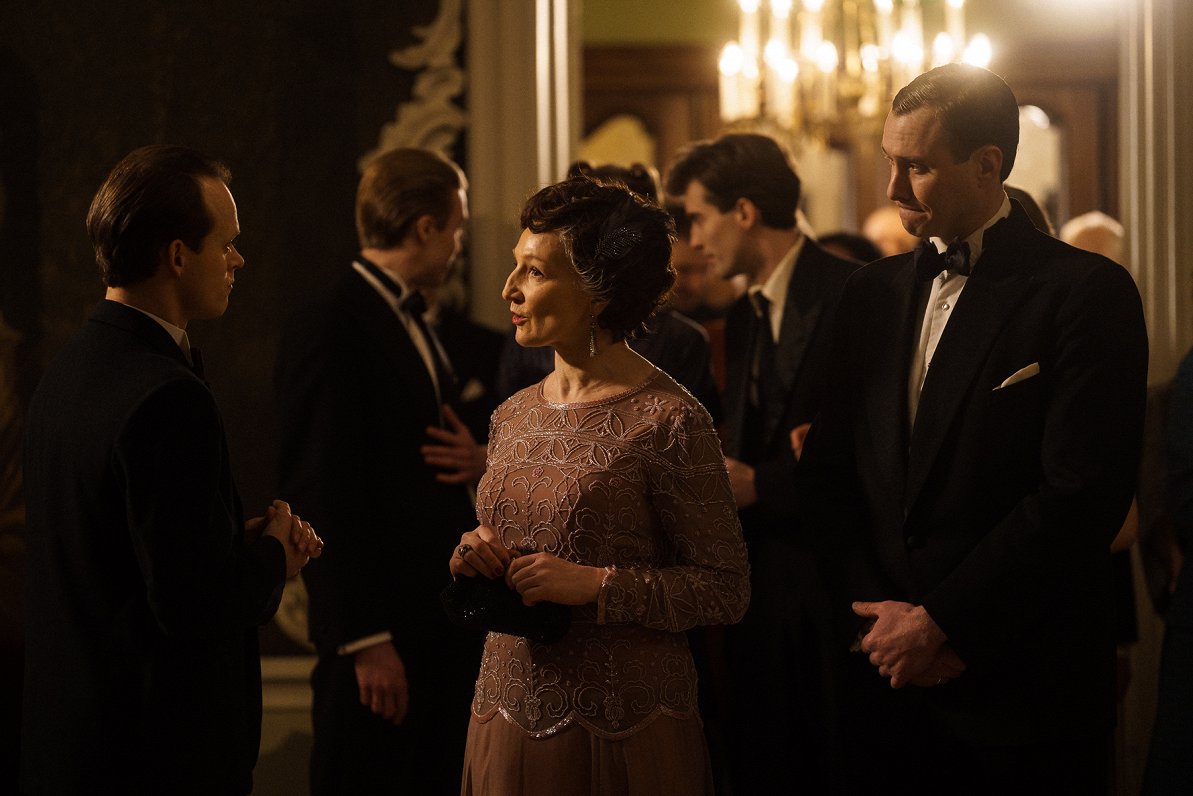
Multi-series film “Emily. Queen of the Latvian Press ”
Photo: Andrejs Strokins
–
–
In an interview, Russian popular theater actress Victoria Isakova, speaking about her roots in the Dagestan family, admitted in a conversation that she had been persecuted for a lifetime by the patriarchal worldview. The actress revealed that she has always tried to quench her craving for something more, to break out of the kitchen, but this “kitchen” has suppressed her self-esteem all her life. Even close family ties, as well as generational differences for the right, can affect a woman’s choices and her right to freedom. Maybe that’s why Emilija said in her characteristic notion that she doesn’t want to be just a laundry and a cook for her husband. Emily essentially took on the role of a man, providing for Sister Minnie and Annie, as well as her mother and foster son, George. And yet the gene of the two sisters’ “border crossers” helped them gain recognition, fame and, presumably, fulfillment. Emilija decorated her life with the most beautiful and expensive interior, furnished a summer house in Jurmala and participated in Anton’s farm in Valdeki manor. She owned exquisite costumes, brought from Paris and Berlin, and Emily herself went abroad for plastic surgery. Annie had a brilliant career in the best theaters in Europe, and they remained as one family even after her son Juris was adopted.
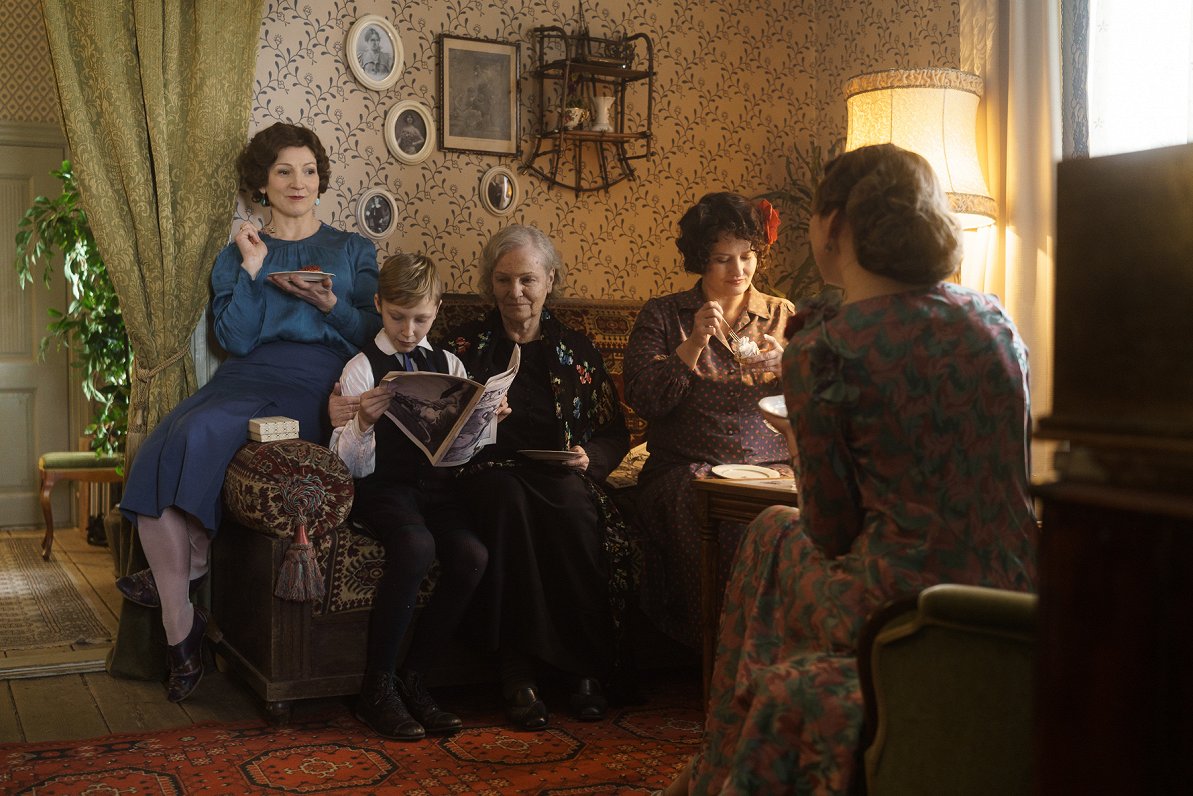
Multi-series film “Emily. Queen of the Latvian Press ”
Photo: Andrejs Strokins
–
–
Big small role players
The main roles in the film are played by Guna Zariņa, Juris Bartkevičs, Artūrs Skrastiņš and many other well-known actors in Latvia. With the greatest excitement, I watched the “new role” of a certain performer, as well as captured the moments when actors and non-actors flourished, which, at least for the time being, are less recognizable. Uva Segliņa, an actress who also practices gestalt therapy, merged organically with Emilia’s neurotic sister Minnie, playing with the image of a victim who is constantly fainting and suffering a lot. Samira Adgezalova-Abidi, an actress from Liepāja Theater, brought life to the Unknown Being with the blood of an Azerbaijani woman, who aroused her spirits during a night of screening. Pēteris Krilovs, the favorite teacher and director of many acting students, played the President of Latvia Gustavs Zemgals.
Ulmanis does not appear in the film, but its creators warned in time that lovers of Ulmanian romance may not have all this in mind.
The Benjamins did not recognize the new regime of the authoritarian regime, which also meant censorship of the “latest news”.
The relationship between Emilija and Jānis Ziemeļnieks plays an important role throughout the series. The fragile opium poet, portrayed by Caspara Hall, embodies an almost cosmic-scale personality with one foot in the grave and the other in another galaxy. His and Emilia’s obscure and therefore misunderstood flirtation is no longer being dealt with, because the North is dying by the fatal prophecy of the Unknown. True, a day later.

Kaspars Zāle in the role of Jānis Ziemeļnieks (real name Jānis Krauklis)
Photo: Andrejs Strokins
–
–
Writer and party member Vili Lācis is played by Jēkabs Reinis, who was introduced to the title role of the multi-series art film “Red Forest”. Reinis’ appearance, style and elegance, as well as his genuine passion for Latvian history, make him a wonderful fit for this historical drama. Jacob Reinis could have come from a Hollywood movie in the 1950s and, in a parallel reality, shook hands with Clark Gable. His Bear is not the most generous lover and partisan fighter. Unfortunately, both in the film and in his life, the writer’s beloved writer allowed small and great betrayals, but after leaving Emilija asking for help in 1941, she also sat in the lobby, sitting comfortably in the chairs of the new government. Emilia was then taken to death by a Siberian train.
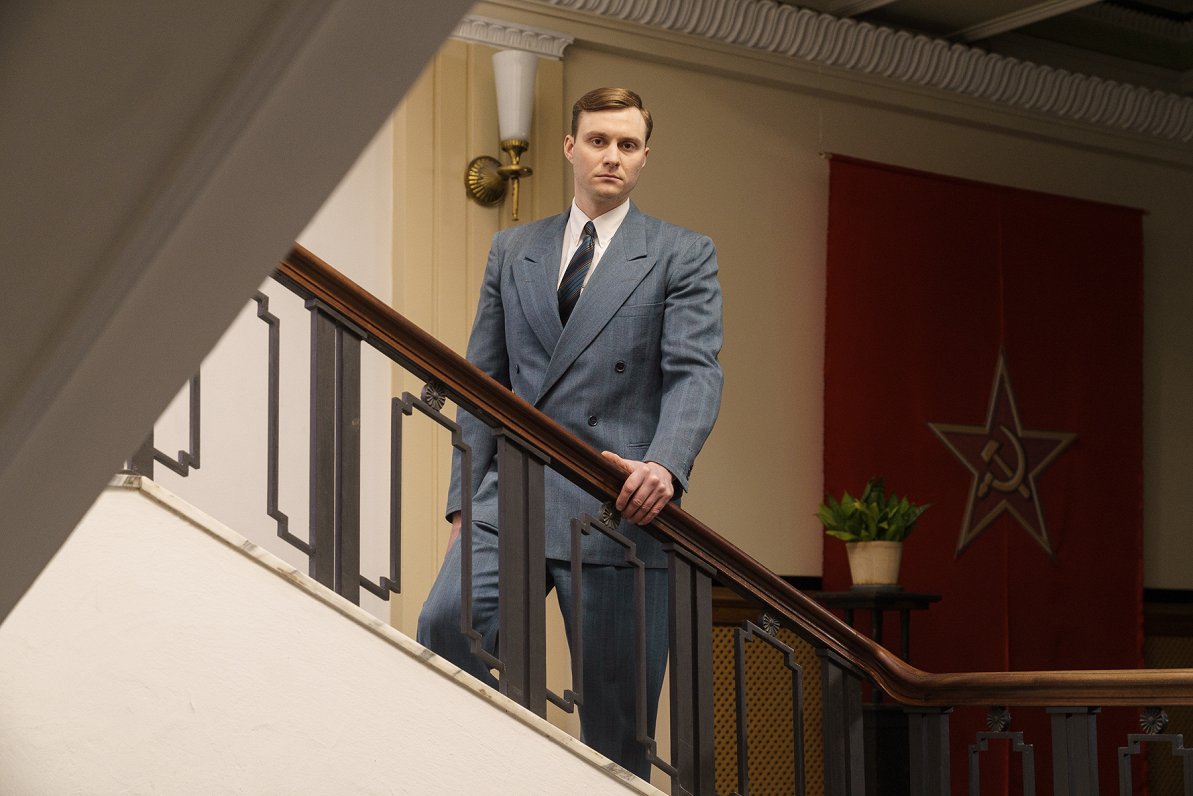
Multi-series film “Emily. Queen of the Latvian Press ”
Photo: Andrejs Strokins
–
–
In the “Red Forest” we also met Mikhail Chekhov’s Riga Russian Theater actor Pavel Grishkov, who continues to be a Russian officer in this film as well, taking on “enemies of the people” from the newspaper “Latest News” in the final series. The actor currently works both as an event manager and collaborates with various brands, but for the viewer’s selfish intentions, I would like to see him realize himself, for example, in a high-quality Russian TV series. Grishkov has language skills, he is loved by a film camera, which allows the actor to show his body plastics in close-up. In addition, his cruel KGB heroes from the Red Forest and Emilia are able to instill fear and a tense atmosphere, which, once again, reads well through the camera’s eye.
And, of course, we need to talk about Baiba Brock, who portrays Emilia’s “alter ego” – gentle, trusting Bertiņš, who is more than just a maid in Emilia’s life. Berta is a full-blooded guest of the night’s dinner, with whom to sip a drink and discuss the juicy headlines. Feeling Emily’s mood in the finest nuances, Berta always knows the right words to soothe Emily’s anxious, important life, but this gentle friendship is not reciprocal, mainly due to Emilia’s lack of subtlety. Emilija does not feel the difference in Berta’s social situation. At times, it seems that she will call out Mary Antoinette, “if there is no bread to eat cakes,” after listening to Berta’s worries. It should be noted that there is no information about Bert’s history in the documents of the farm, Bert’s image is the fruit of the filmmakers’ imagination.
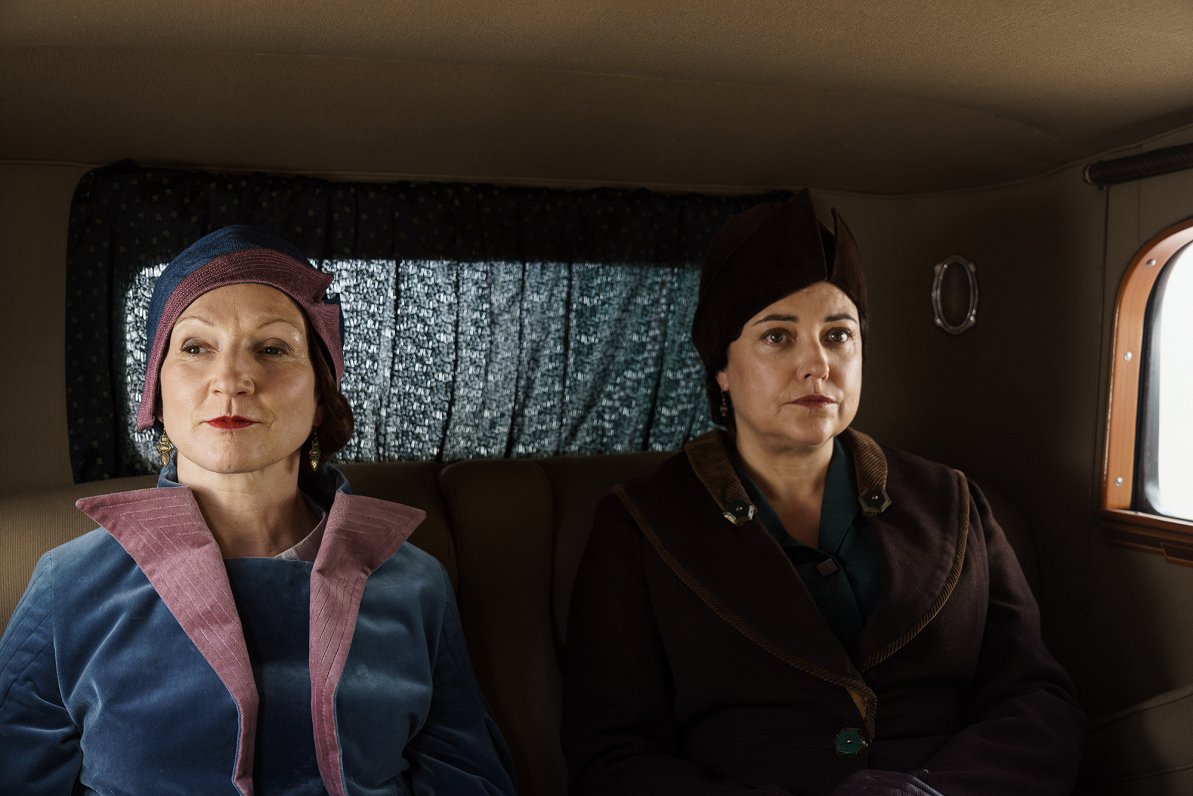
Movies “Emilia. Queen of the Latvian Press ”
Photo: Andrejs Strokins
–
–
Audiovisual encyclopedia
The tremendous work of costume designers and props Kristīne Jurjāne and Aivars Žukovskis can be felt in every frame of the film, in the finest details. The film shows authentic furniture belonging to Benjamins, the original stained glass windows of the artist Kārlis Brencēns in Pfābu house and a chandelier brought from Venice, the edited powder puffs, combs and newly made clothes – all this creates an unprecedented 20th century household picture in Latvia, which could be considered as an audiovisual encyclopedia.
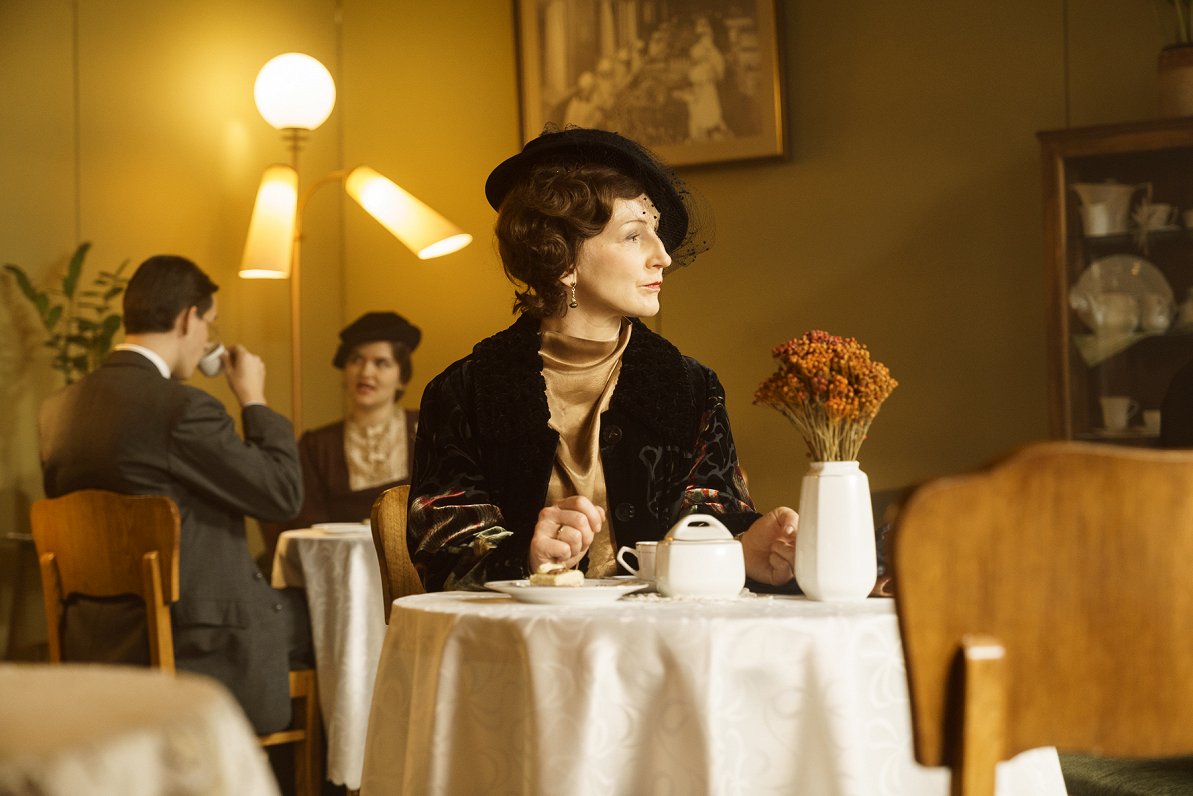
Multi-series film “Emily. Queen of the Latvian Press ”
Photo: Andrejs Strokins
–
–
The work invested is so valuable not only because it provides an accurate representation of the era, but has also allowed people from outside to dedicate Emily’s pottery, share his memories, and offer antiques and flowers. In a surprisingly short time, the filmmakers have achieved that there is currently a film in Latvia about the 1920s and 1940s, in which the experienced historian Ineta Lipša is also involved.
“Emilija” has not only acquired gorgeous decorative elements, but its script has been enriched with precise historical facts and in-depth research of sources, raising the quality bar of the script to the level of international TV projects.
Of course, all this would not be possible without experienced film directors – they are Kristīne Želve, Dāvis Sīmanis, Andis Mizišs and Gints Grūbe. Script writers – Baņuta Rubess, Ivo Briedis, Aiva Birbele, Tabita Rudzāte, consultant – Māra Zālīte. Significantly, absolutely everyone involved in the creative team has already been involved in Benjamin’s story, working on other productions, screenplays and movies. Among them are Māra Zālīte’s play “Bear” for the National Theater, Dāvis Sīmanis’ film about the Jewish savior Jean Lipki “Father’s Night”, Kristīne Želve’s painful story about one woman’s courage “Mary’s Journey”, Gints Grūbe’s long work on documents dedicated to Latvian history .
Death is not the end
In the context of “Emilia”, a number of other topics and reflections could be developed. About the fact that “Emilia” should be shown in schools. Especially in online modes, when everyone lives on the screens, it would be especially beneficial. About how vulgarly portrayed in Emilija Muktupāvel’s novel, why Willy Lācis betrayed his closest contemporaries, about the easter eggs or references of 20th century history in the film, and the influence of “Latest News” on building a democratic state. About Gorbachev’s wife Rice’s visit to Benjamin’s summer residence, where she arrived with her chef’s suite after the free occupation of Latvia. Or about the famous prophecies of Eizen Finka and the growing interest in Europe in the mysteries of the afterlife. The best known of them – Emilija Benjamin will die on bare boards. It happened, but there are so many unanswered questions and riddles about her own personality, the tragic consequences of her decisions, her hidden thoughts and passions. Be that as it may, the noble press queen Benjamin got on the train to Siberia in the most beautiful nightgown. She believed in her inner strength and savior, who did not come, but did not lose her self-esteem until the last breath. There he was buried – in the Usoļlaga slave camp, in the embrace of autumn leaves wrapped in a white sheet.
–
